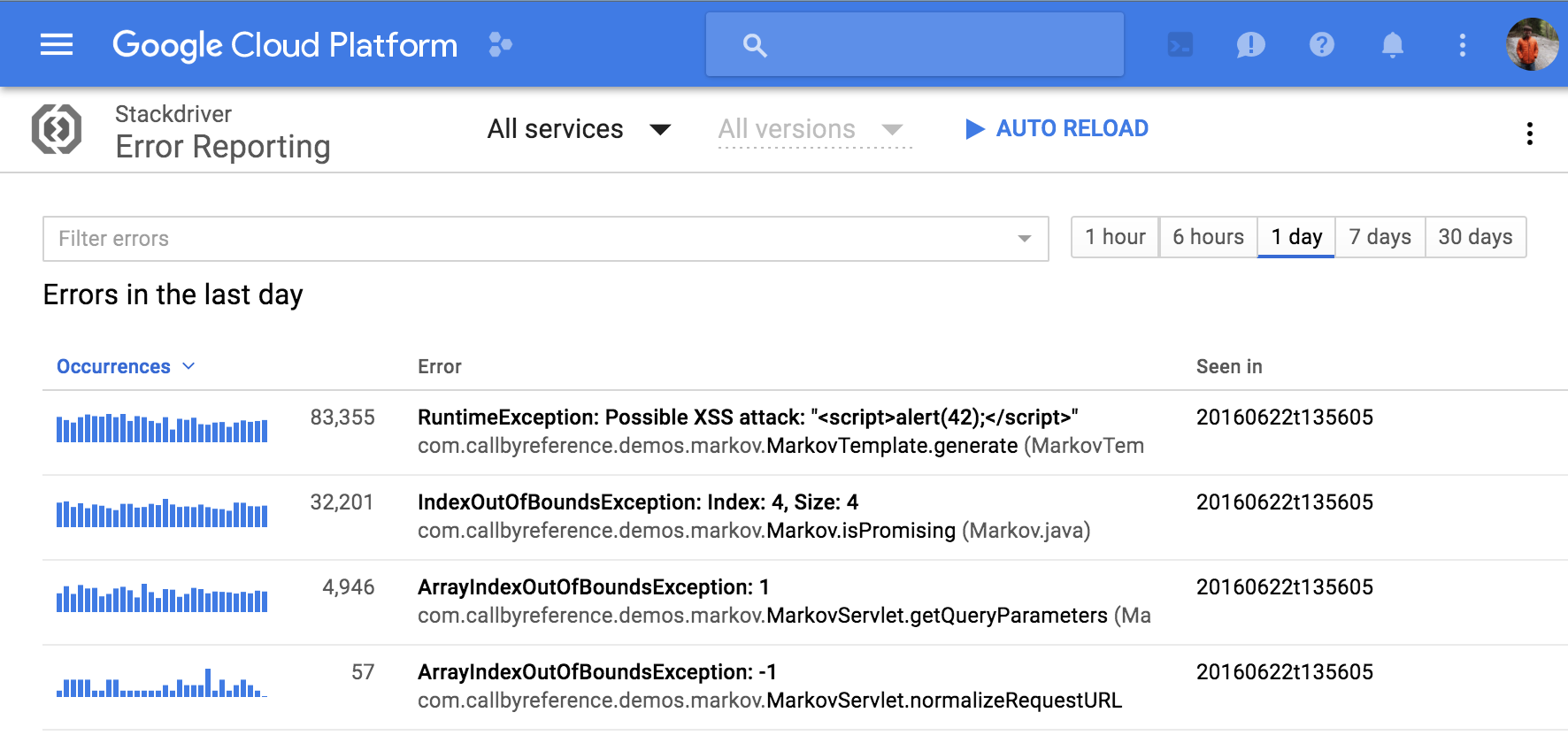https://github.com/googleapis/nodejs-error-reporting
Node.js client for Stackdriver Error Reporting: Count, analyze and aggregate the crashes in your running cloud services.
https://github.com/googleapis/nodejs-error-reporting
error-reporting nodejs stackdriver
Last synced: 3 months ago
JSON representation
Node.js client for Stackdriver Error Reporting: Count, analyze and aggregate the crashes in your running cloud services.
- Host: GitHub
- URL: https://github.com/googleapis/nodejs-error-reporting
- Owner: googleapis
- License: apache-2.0
- Created: 2017-07-26T20:44:53.000Z (almost 8 years ago)
- Default Branch: main
- Last Pushed: 2024-03-21T10:55:57.000Z (over 1 year ago)
- Last Synced: 2024-04-01T11:04:30.224Z (over 1 year ago)
- Topics: error-reporting, nodejs, stackdriver
- Language: TypeScript
- Homepage: https://cloud.google.com/error-reporting/
- Size: 2.91 MB
- Stars: 87
- Watchers: 44
- Forks: 34
- Open Issues: 13
-
Metadata Files:
- Readme: README.md
- Changelog: CHANGELOG.md
- Contributing: CONTRIBUTING.md
- License: LICENSE
- Code of conduct: CODE_OF_CONDUCT.md
- Codeowners: .github/CODEOWNERS
- Security: SECURITY.md
Awesome Lists containing this project
README
[//]: # "This README.md file is auto-generated, all changes to this file will be lost."
[//]: # "To regenerate it, use `python -m synthtool`."

# [Error Reporting: Node.js Client](https://github.com/googleapis/nodejs-error-reporting)
[](https://cloud.google.com/terms/launch-stages)
[](https://www.npmjs.org/package/@google-cloud/error-reporting)
> Node.js idiomatic client for [Error Reporting][product-docs].
[Error Reporting](https://cloud.google.com/error-reporting/docs/) aggregates and displays errors produced in your running cloud services.
A comprehensive list of changes in each version may be found in
[the CHANGELOG](https://github.com/googleapis/nodejs-error-reporting/blob/main/CHANGELOG.md).
* [Error Reporting Node.js Client API Reference][client-docs]
* [Error Reporting Documentation][product-docs]
* [github.com/googleapis/nodejs-error-reporting](https://github.com/googleapis/nodejs-error-reporting)
Read more about the client libraries for Cloud APIs, including the older
Google APIs Client Libraries, in [Client Libraries Explained][explained].
[explained]: https://cloud.google.com/apis/docs/client-libraries-explained
**Table of contents:**
* [Quickstart](#quickstart)
* [Before you begin](#before-you-begin)
* [Installing the client library](#installing-the-client-library)
* [Versioning](#versioning)
* [Contributing](#contributing)
* [License](#license)
## Quickstart
### Before you begin
1. [Select or create a Cloud Platform project][projects].
1. [Enable the Error Reporting API][enable_api].
1. [Set up authentication with a service account][auth] so you can access the
API from your local workstation.
### Installing the client library
```bash
npm install @google-cloud/error-reporting
```
This module provides custom Error Reporting support for Node.js applications.
[Error Reporting](https://cloud.google.com/error-reporting/) is a feature of
Google Cloud Platform that allows in-depth monitoring and viewing of errors reported by
applications running in almost any environment.
However, note that [@google-cloud/logging-winston](https://github.com/googleapis/nodejs-logging-winston) and [@google-cloud/logging-bunyan](https://github.com/googleapis/nodejs-logging-bunyan) automatically integrate with the Error Reporting service for Error objects logged at severity `error` or higher, for applications running on Google Cloud Platform.
Thus, if you are already using Winston or Bunyan in your application, and don't need custom error reporting capabilities, you do not need to use the `@google-cloud/error-reporting` library directly to report errors to the Error Reporting Console.

# When Errors Are Reported
The `reportMode` configuration option is used to specify when errors are reported to the Error Reporting Console. It can have one of three values:
* `'production'` (default): Only report errors if the NODE_ENV environment variable is set to "production".
* `'always'`: Always report errors regardless of the value of NODE_ENV.
* `'never'`: Never report errors regardless of the value of NODE_ENV.
The `reportMode` configuration option replaces the deprecated `ignoreEnvironmentCheck` configuration option. If both the `reportMode` and `ignoreEnvironmentCheck` options are specified, the `reportMode` configuration option takes precedence.
The `ignoreEnvironmentCheck` option should not be used. However, if it is used, and the `reportMode` option is not specified, it can have the values:
* `false` (default): Only report errors if the NODE_ENV environment variable is set to "production".
* `true`: Always report errors regardless of the value of NODE_ENV.
## Setup, Configuration, and Examples
See the documentation for setup instructions, configuration options, and examples: https://cloud.google.com/error-reporting/docs/setup/nodejs
Additional code samples can also be found here: https://github.com/GoogleCloudPlatform/nodejs-docs-samples/tree/main/error-reporting
The [Error Reporting Node.js Client API Reference][client-docs] documentation
also contains samples.
## Supported Node.js Versions
Our client libraries follow the [Node.js release schedule](https://github.com/nodejs/release#release-schedule).
Libraries are compatible with all current _active_ and _maintenance_ versions of
Node.js.
If you are using an end-of-life version of Node.js, we recommend that you update
as soon as possible to an actively supported LTS version.
Google's client libraries support legacy versions of Node.js runtimes on a
best-efforts basis with the following warnings:
* Legacy versions are not tested in continuous integration.
* Some security patches and features cannot be backported.
* Dependencies cannot be kept up-to-date.
Client libraries targeting some end-of-life versions of Node.js are available, and
can be installed through npm [dist-tags](https://docs.npmjs.com/cli/dist-tag).
The dist-tags follow the naming convention `legacy-(version)`.
For example, `npm install @google-cloud/error-reporting@legacy-8` installs client libraries
for versions compatible with Node.js 8.
## Versioning
This library follows [Semantic Versioning](http://semver.org/).
This library is considered to be **stable**. The code surface will not change in backwards-incompatible ways
unless absolutely necessary (e.g. because of critical security issues) or with
an extensive deprecation period. Issues and requests against **stable** libraries
are addressed with the highest priority.
More Information: [Google Cloud Platform Launch Stages][launch_stages]
[launch_stages]: https://cloud.google.com/terms/launch-stages
## Contributing
Contributions welcome! See the [Contributing Guide](https://github.com/googleapis/nodejs-error-reporting/blob/main/CONTRIBUTING.md).
Please note that this `README.md`, the `samples/README.md`,
and a variety of configuration files in this repository (including `.nycrc` and `tsconfig.json`)
are generated from a central template. To edit one of these files, make an edit
to its templates in
[directory](https://github.com/googleapis/synthtool).
## License
Apache Version 2.0
See [LICENSE](https://github.com/googleapis/nodejs-error-reporting/blob/main/LICENSE)
[client-docs]: https://cloud.google.com/nodejs/docs/reference/error-reporting/latest
[product-docs]: https://cloud.google.com/error-reporting
[shell_img]: https://gstatic.com/cloudssh/images/open-btn.png
[projects]: https://console.cloud.google.com/project
[billing]: https://support.google.com/cloud/answer/6293499#enable-billing
[enable_api]: https://console.cloud.google.com/flows/enableapi?apiid=clouderrorreporting.googleapis.com
[auth]: https://cloud.google.com/docs/authentication/getting-started